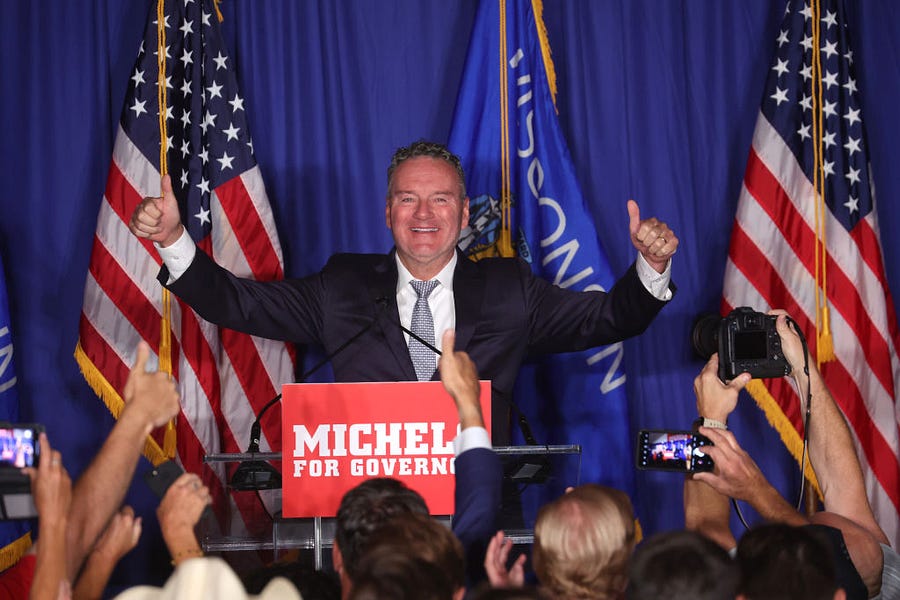In a consequential GOP gubernatorial primary in Wisconsin, voters tapped construction business executive Tim Michels narrowly over former Lt. Gov. Rebecca Kleefisch in what has been a contentious race. Michels was beating Kleefisch 47 percent to 42 percent Wednesday morning, with more than 95 percent of the vote tallied.
The win is also a victory for former President Donald Trump over former Vice President Mike Pence—who has fallen out of favor with the Make America Great Again crowd since refusing to attempt to overturn the results of the 2020 election.
The two issued competing endorsements in the Wisconsin contest, highlighting a widening rift in the Republican Party. Though the race remained close, it became clear within a couple of hours of polls closing that Michels, Trump’s pick, would win.
Kleefisch did take the lead briefly, thanks to suburban areas in Wausau and elsewhere. But her edge remained paper thin and quickly disintegrated as more results from rural areas came in.
Around three hours into the night, Kleefisch conceded the race. “The fight is truly against Tony Evers, and the liberals who want to take away our way of life,” she said.
In a victory speech from an event in Waukesha, Michels said that “as governor, my number one priority is to take care of the hard-working people in Wisconsin.”
Michels struck a gracious note to his competitors, calling Kleefisch and state Rep. Tim Ramthun “tremendous” candidates.
Kleefisch was seen as an early favorite until Michels entered the race. He quickly turned it competitive—in part thanks to a massive infusion of his own cash and then the Trump endorsement, which may have turned out to be his golden ticket to November.
Michels will go head-to-head with incumbent Democratic Gov. Tony Evers. If polling is any indication, the race will be a tough one.
“I think it’s going to come down to who can get their team fired up,” former U.S. Rep. Reid Ribble, a Wisconsin Republican, told The Dispatch.
In stump speeches, Michels has leaned on his executive experience in the Brownsville-based energy and infrastructure construction company he leads alongside his brothers. The Michels Corporation employs around 8,000 workers.
“There’s hardly a road or a major infrastructure project that he hasn’t had his fingers on. Every road and bridge in the state practically he’s built,” Ribble said. “His company employs a lot of workers in Wisconsin. He’ll play that to the hilt if he’s the nominee.”
The Evers campaign released a statement attempting to portray Michels as too Trumpy for the state: “The Republican Party has chosen the most extreme and divisive nominee possible, one that will tell Donald Trump anything just to keep his endorsement.”
The state as a whole is hard to pin down politically: It was key to Trump’s victory in 2016 and, four years later, key to Joe Biden’s win. The last midterm election in 2018 saw a swing back toward Democrats: Voters elected Evers and re-elected Sen. Tammy Baldwin. It remains to be seen how this midterm cycle will play out.
Pollsters and politicos on the ground had predicted a tight race for the Republican nod for governor: Trafalgar Group in a poll Monday found that the top two candidates were neck and neck, with 43.8 percent of likely GOP primary voters preferring Michels and 43.4 percent preferring Kleefisch. Another gubernatorial candidate, Ramthun, polled at 7.5 percent. The margin of error was 2.9 percent.
Wisconsin is just the latest in a series of endorsement wars between Trump and Pence. So far, more Trump-endorsed candidates have come out on top.
Just last week in Arizona’s gubernatorial race, Trump-endorsed former local TV news anchor Kari Lake triumphed over Pence-endorsed Karrin Taylor Robson, a Republican lobbyist.
But Pence has had his victories as well. He went to Georgia to rally with Georgia Gov. Brian Kemp. Trump had backed GOP challenger David Perdue, and his PAC spent more than $2.6 million supporting Perdue. Regardless, Kemp handily won the nomination.
Trump-endorsed candidates have usually trumpeted the former president’s false claims about the 2020 election and pledges to change election laws. Pence-endorsed candidates have tended to use more caution in how they described the 2020 election, with few going as far as denying Biden’s victory.
But there are some exceptions. “I feel like it was rigged,” Kleefisch said in April when asked about the 2020 election on a radio interview. But she said last week that trying to overturn Biden’s win would unconstitutional.
But Michels did not run a cut-and-dry, stolen-election campaign as other Trump-endorsees have in other states. He did say he would consider signing legislation from the GOP-majority legislature to overturn the state’s 2020 election results if elected.
That may be why some Trump allies endorsed Ramthun, including Trump’s former national security adviser Michael Flynn, as well as MyPillow CEO Mike Lindell. Ramthun failed to get past 6 percent of the vote Tuesday.
Ramthun signaled ahead of the election that he may challenge the election. “Am I going to question the outcome tomorrow? Absolutely. I want to have it audited before I land on finally where I will take a position on the results,” Ramthun told radio host Stan Milam. The move would be true to form for Ramthun: He also authored legislation attempting to decertify the 2020 election results.
As Sarah Isgur noted for The Sweep Tuesday, it remains to be seen how Trump’s picks will fare when they face the test of the general election.
Meanwhile, Trump’s grip on the Republican Party in Wisconsin was not absolute. Down ballot, Assembly Speaker Robin Vos declared victory in a close primary against a Trump-endorsed challenger, Adam Steen. With 95 percent of precincts reporting, Vos had 51.3 percent to Steen’s 48.7 percent as of early Wednesday. The race was closer than it likely would have been, had Trump not waded into the primary with an endorsement last week. Steen won Trump’s favor by focusing on the false claims that the 2020 election was stolen. Vos earned ire from the former president by not supporting efforts in the state legislature to decertify the 2020 election.
Another high profile race—the contest for U.S. Senate contest—was already a foregone conclusion by the time the primary rolled around. Mandela Barnes, 35, handily secured the Democratic nomination. Barnes was the state’s first black lieutenant governor alongside Evers.
Barnes’ win was helped by the fact that his strongest Democratic opponents—Outagamie County Executive Tom Nelson, Milwaukee Bucks executive Alex Lasry, and Wisconsin State Treasurer Sarah Godlewski—dropped out and endorsed him last month.
Barnes will go up against Sen. Ron Johnson in November. Democrats have targeted the two-term lawmaker as the most vulnerable Republican senator, and winning the state will likely be key for them to maintain control of the chamber.
“Democrats consolidated remarkably fast behind Barnes. That suggests that party leaders are really emphasizing cohesion and turnout this fall,” Eric Loepp, an associate professor of politics at University of Wisconsin–Whitewater, told The Dispatch. “It also suggests that Democrats in the state are serious about defeating Johnson, and many are willing to support their second- or third-favorite Democratic candidate to see that happen.”
Republicans, meanwhile, will seek to tie Barnes to the progressive wing of the Democratic party, which won’t be much of a stretch: Barnes has won the endorsements of progressive heavyweights like Sens. Bernie Sanders of Vermont and Elizabeth Warren of Massachusetts, as well as Rep. Alexandria Ocasio-Cortez of New York. He also has won the endorsements of more moderate Democrats, from Sens. Cory Booker to Rep. James Clyburn.
The Republican Party of Wisconsin has already put such messages into action, snatching the URL “mandelabarnesforsenate.com.” The front page prominently displays a picture of Barnes posing with an “abolish ICE (Immigration and Customs Enforcement), a picture of Barnes posing alongside progressive Rep. Ilhan Omar, alongside anti-Barnes press releases and headlines.
“This is like a gift from God to Ron,” Ribble said of a Barnes-Johnson matchup. “You’ve got the most progressive Bernie Sanders, Elizabeth Warren-esque candidate to run against. I actually think this plays into Johnson’s favor and I would now put him as the odds-on favorite to now win.”
Ribble said he expects Johnson to also try to tie progressive policies—and Barnes—to current economic troubles: “I think Johnson is gonna drive home the 9 percent inflation rate over and over and over again. And gasoline that costs more than $3 a gallon. He’s going to jump on that and say it was exactly these Bernie Sanders policies that Mandela Barnes supports that brought us to this place.”
“The only move that Ron Johnson has is to throw mud and make stuff up about Mandela Barnes because his own standing with voters is in the toilet,” Joe Zepecki, a Milwaukee-based Democratic strategist, told The Dispatch. He said Democrats will point out the differences between Johnson’s background as a wealthy businessman against Barnes, whose mom worked as a public school teacher and whose father worked for United Auto Workers.
On the campaign trail, Barnes has contrasted his wealth and Johnson’s—and those of his former Democratic competitors. “Most senators couldn’t tell you the cost of a gallon of milk. Or how much beef has gone up this year. But I’m not like most senators, or any of the other millionaires running for Senate,” he said in one ad.
Meanwhile, Johnson’s favorability among voters is low, with 37 percent of poll respondents viewing him favorably and 46 percent viewing him unfavorably. But Biden’s numbers are also low, and Johnson may get a boost from a political environment likely to be favorable to Republicans.
“Midterms are usually rough for the president’s party, and there are many economic indicators recently that spell trouble for Democrats in November,” Loepp added. “However, the most likely saving grace for Democrats is if they face Republican candidates with serious policy or personal flaws, and there are many who would put Johnson in that category.”
Ribble noted that Johnson’s “Trumpian attitude,” particularly when it came to controversial statements he made surrounding the COVID-19 pandemic, have likely dampened his appeal to moderate and Republican-leaning independent voters. He has also sparked a series of controversies related to the 2020 election and the Capitol riot.
One thing Johnson’s controversies have not cost him: the support of the party’s base. Now he’ll have to find out whether he can drum up enough support in the general election to carry him through.
“He became a lightning rod,” Ribble said. “I think that didn’t help him. It helped him in a Republican primary but he doesn’t have a Republican primary.”
Johnson had one challenger: David Schroeder, a former educator. With 95 percent of the estimated votes counted early Wednesday morning, Schroeder had garnered 16.3 percent of the vote.






Please note that we at The Dispatch hold ourselves, our work, and our commenters to a higher standard than other places on the internet. We welcome comments that foster genuine debate or discussion—including comments critical of us or our work—but responses that include ad hominem attacks on fellow Dispatch members or are intended to stoke fear and anger may be moderated.
With your membership, you only have the ability to comment on The Morning Dispatch articles. Consider upgrading to join the conversation everywhere.